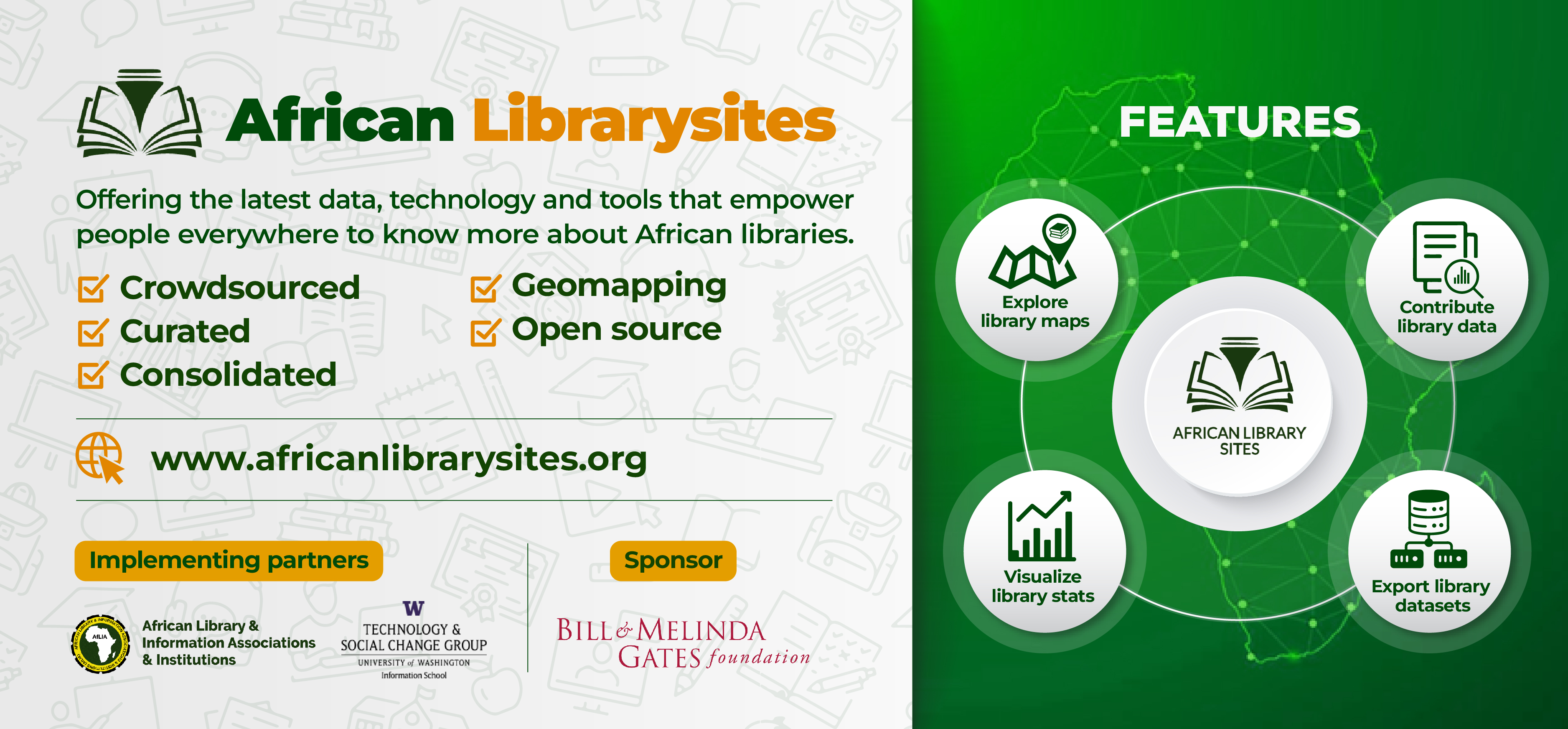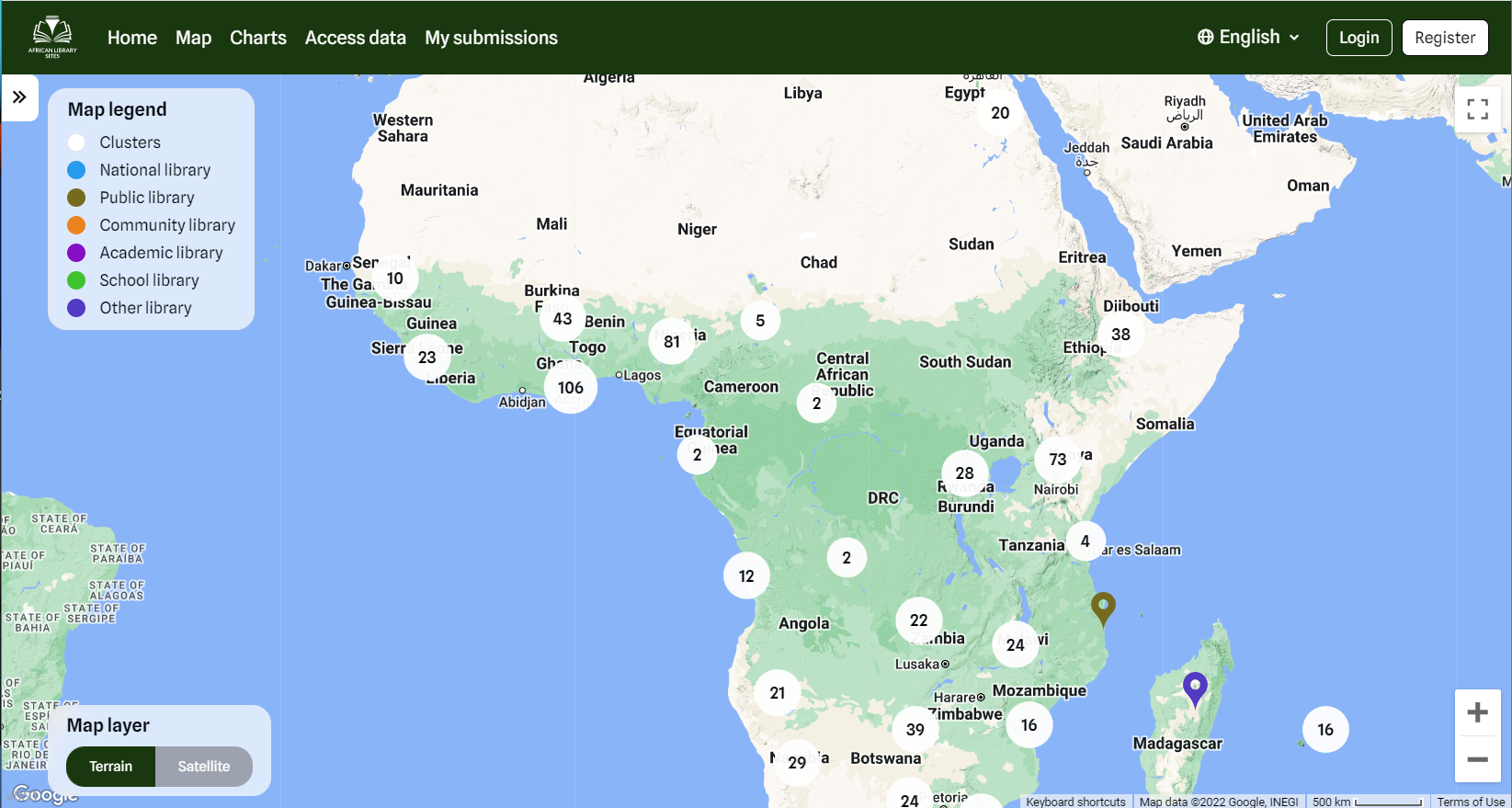Introducing the African Librarysites platform: a continental source of consolidated library location data for development

7 DECEMBER 2022
Background
Critical to building stronger libraries, and achieving SDG4 and Aspiration 1 and 5 of the AU Agenda 2063 is understanding the library and information sector of Africa. Unfortunately, there is very little data especially about public and community libraries in Africa. This hampers efforts to develop the library sector and its impact on their communities, in general, and opportunities to work in partnership with development agencies.
The African Library and Information Associations and Institutions (AfLIA), working in partnership with the Technology and Social Change Group (TASCHA) of the University of Washington, Seattle, USA with financial support from the Global Libraries Program of the Bill and Melinda Gates Foundation, has since 2017 been developing a system to make libraries in Africa more visible to stakeholders, potential partners and their users. The project is called the Advancing Library Visibility in Africa (ALVA).
After years of working with various library authorities across Africa, it is apparent that quite a number of databases on library locations are available predominantly at the national or local level. Unfortunately, not all are readily accessible to the public. Even for those databases that are accessible, most are largely incomplete or outdated. At present, there is no known database or platform dedicated to library locations with a continental or sub-regional coverage.
It is worth noting that existing datasets on library locations complement each other in terms of geographical coverage and the information they contain, however they are almost never readily available in a consolidated, freely accessible way. Largely, the absence of convergence points for library location information in Africa is counterproductive to the concerted efforts at enhancing their visibility, promoting library advocacy and building partnerships.
Through this project, an integrated platform (website) known as the African Librarysites platform has been developed to crowdsource and host data about libraries in Africa – including GPS coordinates of libraries, display hosted data in various user-friendly downloadable visual charts and also give free access to end users to download (filterable) library datasets hosted on the platform.
Key platform features
The African Librarysites Platform has been designed to offer the latest data, technology and tools that empower people everywhere to know more about libraries of all types in Africa. Summarily, the platform has the following key features:
- Contribute library data: Users can easily contribute data about their libraries through crowdsourcing. The platform has a robust workflow for quality assurance on data submitted. The African Librarysites platform supports data from all library types and bulk import of already existing library location datasets. Offline data collection is also supported using the platform’s custom mobile apps.
- Explore library maps: Users are able search or find locations of specific libraries that are available on the platform via interactive street and satellite maps. GPS locations of maps along with other descriptive information of libraries can be seen by users.
- Visualize library stats: Users have access to custom reporting and visualization functionality. Datasets on the platform can be custom filtered (by country and or library type) and visualized through charts. Charts generated on the African Librarysites platform can be downloaded for use outside the platform.
- Export library datasets: Users have access to easily exportable data adaptable in several formats (e.g. CSV).
- Open API: Platform offers easy integration with other softwares or library-based platforms e.g. websites of National Libraries or National Library Associations.
- Multilingual: Platform supports auto-translation of up to four languages, i.e. English, French, Portuguese and Arabic.

The African Librarysites platform
Africa’s premier source of consolidated library location data for development
Resource for advocacy and development
This data platform is re-defining the frontiers of advocacy and policy making for the library sector in Africa. Library leaders and stakeholders will now have access to concrete data to support local, national, sub-regional and regional library developmental agenda, including the SDGs and the AU Agenda 2063.
For instance, the platform shows the GPS locations of public and community libraries across a country in a map view, thus, giving an indication of equity or otherwise of the geographical spread of libraries and the resultant access to library services.
Based on current population census data of countries, the platform gives statistics on library per capita (for public and community libraries). Such important development data gives an indication of the adequacy or otherwise of the number of libraries serving the populace of a particular country, in comparison to international standards.
African Librarysites is a vehicle to empower individual libraries in Africa to be more visible and well positioned for vertical and horizontal partnerships as they seek to improve their impact in the communities they serve. The platform also democratizes access to library information and allows individual libraries to tell their own stories.
The platform has a dynamic and iterative data collection process. On an ongoing basis, the data collection template can be revised to gather more and more important data about African libraries to facilitate investment or development decisions of Governments and development partners in the sector.
In the medium term, the African Librarysites platform will be able to generate data on: types of library services available at individual libraries (including ICT access and training); development-oriented initiatives embarked on by libraries; libraries with literacy programs for children and young people in Africa; number of users who participated in reading programs and other services in a year; evidence of impact of library services such as reading programs on users who participated etc.
Official launch
The African Librarysites platform will be officially launched in January 2023. The launch will include extensive orientation on the platform’s functionalities in the 3 official languages of AfLIA (English, French and Portuguese) for all LIS professionals across the 5 sub-regions of Africa. Watch this space for the dates. Let us join hands and forces to make this happen. Official hashtag – #LocateMyLibrary #AfricanLibrarysites
For enquiries, kindly contact the ALVA project via: Dr. Joel Sam – jsam@aflia.net or Stanley Boakye-Achampong – researchcoordinator@aflia.net
